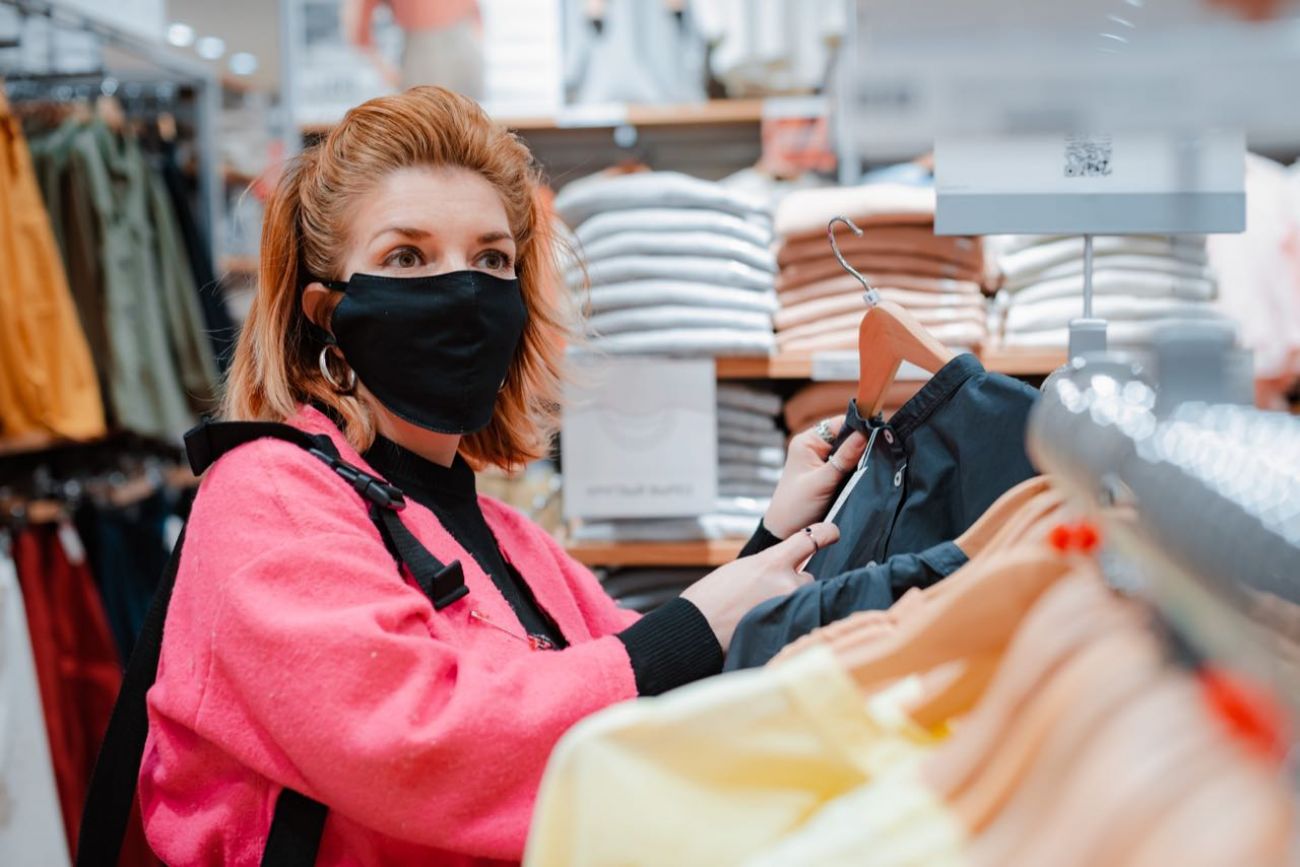Michigan stores can reopen. It’s unclear how many shoppers will follow.

June 1 update: Gov. Whitmer to allow bars, restaurants, retailers to reopen June 8
Hours after Von Maur reopened to customers on Tuesday, several shoppers had already made their way to the Grand Rapids department store.
Spring/summer merchandise was fully stocked, and additional cleaning had been done.
A leaner staff, about eight employees, was there to help anyone who came in on the new appointment basis allowed by Michigan Gov. Gretchen Whitmer’s latest executive order allowing “nonessential” stores to open.
After being closed for more than two months due to state restrictions to slow the coronavirus, Von Maur joins many Michigan retailers and their customers who are now hoping a return to in-person shopping signals the start of a sales rebound.
- The latest: Michigan coronavirus map, curve, chart, updated COVID-19 news
- Dashboard: Michigan coronavirus testing numbers, trends, COVID-19 data
- Gov. Gretchen Whitmer extends Michigan stay-at-home order through June 12
- Small gatherings, non-essential doctors' visits now allowed, Gov. Whitmer says
“Everyone’s been super joyful to get to walk around, even if they’re not looking for something special, and browsing for new stuff,” said manager Claire Espeset.
The 90,000-square-foot store opened in October at Woodland Mall on the city’s south side. The higher-end and family-run chain from Iowa replaced a closed Sears in time for the holiday season — just as retail spending was setting a new national record.
Overall retail sales reached $5.46 trillion in the United States in 2019, according to Statistica, a market data firm. That’s a gain of more than $1 trillion in six years. At the same time, online sales grew its market share, with forecasts calling for it to comprise 12 percent of overall retail sales by the end of this year.
But COVID-19 and the statewide shutdown in March added layers of uncertainty for the state’s retailers who collectively employed about 450,000 or 10 percent of Michigan workers before the pandemic. Several stores and shopping centers in southern and western Michigan are reopening this week, while others say they’re waiting until mid-June or longer.
Like Von Maur, stores are trying to adapt to new ways of face-to-face sales, hoping that initial limitations of 10 shoppers at a time, social distancing and facemasks will rebuild sales and soon return to regular operations. While grocery and dollar stores showed sales jumps during the pandemic, many other retailers continue to be far below initial 2020 sales forecasts.
“We’re just feeling our way through it,” Espeset said. “We’re hoping this is a step in the right direction and hope we can fully reopen soon.”
Reopening fully also is the goal for the Michigan Retailers Association.
“We want a full reopening as soon as possible, with the idea that retailers are ready to make it work for their individual situations,” said Meegan Holland, spokesperson for the trade group. “It’s hard to have broad rules that apply to all retail.”
While overall retail gains show strength in the sector, many independent stores in Michigan have felt pressures from online sales, rising rents and employee shortages.
Retail employment in Michigan declined by 24.4 percent in April, falling by 113,800 jobs, said Donald Grimes, an economist at the University of Michigan. That followed a long, slow decline in retail jobs, he said, but the extreme drop won’t last past midyear.
“While the industry could lose a few more jobs in May, we think it will be adding jobs after that,” Grimes said. Unclear, though is how many retail jobs will return.
As recovery builds to small gains by 2022, Grimes said, “the net effect is that we think employment in the retail sector will ultimately end up in 2022 with about 22,000 fewer jobs than it had in 2019.”
How those jobs will look is changing, Grimes added. Initial trends from COVID-19 show growth in distribution centers, which can offer more full-time positions at higher pay than at stores, where many jobs are part-time or even seasonal in many areas of the state. One study from Progressive Policy Institute found in 2017 that fulfillment center jobs pay 31 percent more, on average, than brick-and mortar retail jobs in the same area. The average retail sales pay in the state is $12.41 per hour, according to Indeed.com.
“It’s not that people aren’t buying stuff … but they’ll be buying it in a different way,” Grimes said.
What that means for Michigan communities remains to be seen.
“In the more rural counties … the number of people who have to work in retail is enormous,” Grimes said. “If it disappears, it’s the base of activity in a lot of places.”
For larger shopping centers, like Twelve Oaks Mall in Novi, extensive preparations went into reopening. Up to 40 percent of the mall’s 180 stores were set to open this week, with more expected to follow.
A major focus at Twelve Oaks was shopper health precautions, said mall manager Dan Jones. In April, a survey by online retail and business payments information source PYMNTS.com showed “that returning to normal shopping behavior has very little to do with economic recovery or the need to spend – and everything to do with personal safety.”
At Twelve Oaks, tables were removed from the food court, and the play area is closed. Seating areas also were reduced, and multiple signs about face masks and social distancing were posted — all to reassure customers that safety concerns are being addressed.
“As the closure approached, it seemed so unusual to even be considering closing a shopping center,” said Jones. “After two months, we’re anxious [to reopen], but also very cautious.
“We really appreciate our retailers and what they’ve had to go through,” he said. “We look forward to getting people back to work.”
Smaller stores still may be considering when to reopen, and how to survive financially. Many of them are turning to fund-raisers and grant requests, in addition to seeking federal Paycheck Protection Program loans.
Thomas Smith owns Urban Apparel in Muskegon Heights. While the national clothing sector has been hit hard by the pandemic – with sales falling 80 percent from March to April – Smith said he’s hopeful for his 17-year business selling men’s clothing.
Smith is waiting to reopen until he’s sure he can sustain it, and until a time when customers won’t feel constrained by the stay-at-home order. He describes his store as “very small,” and one where social distancing will take some work for him and his one part-time employee to give customers the space they’ll need.
“My plan is not to be the first retailer to open,” Smith said. “I’ll see how it goes with the other ones first.
“I’d like to see the [coronavirus] numbers drop more before I open up, too.”
He said he can wait until mid-June because of a $5,000 grant from the Michigan Economic Development Corp, a quasi-state agency that promotes development. That helped him survive the immediate revenue drop to zero when his store closed on March 23, allowing him to pay his rent and accounts receivable.
“It let me step back and breathe for a minute,” he said.
That’s part of the goal for the Small Business Relief Program through the MEDC. About 2,700 businesses, including restaurants and service providers, along with retailers, received grants from regional economic development groups, with amounts ranging from a few hundred dollars to $10,000.
Those grants helped retain 11,000 jobs out of more than 1 million lost statewide amid the pandemic, according to MEDC estimates, said Joshua Hundt, chief business development officer. The $20 million in grants were funded through the Michigan Strategic Fund, whose board doles out tax credits and grants, and from business attraction funds.
The effort was initiated in March, Hundt said, to focus on downtowns and main commercial corridors. “It was critically important in terms of ensuring that we continue to have small, vibrant communities with small businesses,” Hundt said, notably because those types of locations help to attract larger businesses.
Beyond the immediate concerns about retail, there also are long-term questions for the state’s retailers: How many stores will reopen and survive?
“It’s too soon to tell,” said Holland. “I still have a lot of retailers telling me, ‘I can’t open yet.
“You have to wonder. Will they be able to open at all?”
There are some signs of rebound. At Momentum Outfitters in Traverse City, part of the northern Michigan region allowed to open ahead of Memorial Day weekend, the first few days of business produced “a good, steady weekend,” said manager Dawn Gray.
While not as good as a normal summer weekend, sales reached about 75 percent of goal, Gray said.
“We know it’s not going to be a normal year,” Gray said, “but after a few days, we are very hopeful.”
Business Watch
Covering the intersection of business and policy, and informing Michigan employers and workers on the long road back from coronavirus.
- About Business Watch
- Subscribe
- Share tips and questions with Bridge Business Editor Paula Gardner
Thanks to our Business Watch sponsors.
Support Bridge's nonprofit civic journalism. Donate today.
See what new members are saying about why they donated to Bridge Michigan:
- “In order for this information to be accurate and unbiased it must be underwritten by its readers, not by special interests.” - Larry S.
- “Not many other media sources report on the topics Bridge does.” - Susan B.
- “Your journalism is outstanding and rare these days.” - Mark S.
If you want to ensure the future of nonpartisan, nonprofit Michigan journalism, please become a member today. You, too, will be asked why you donated and maybe we'll feature your quote next time!




